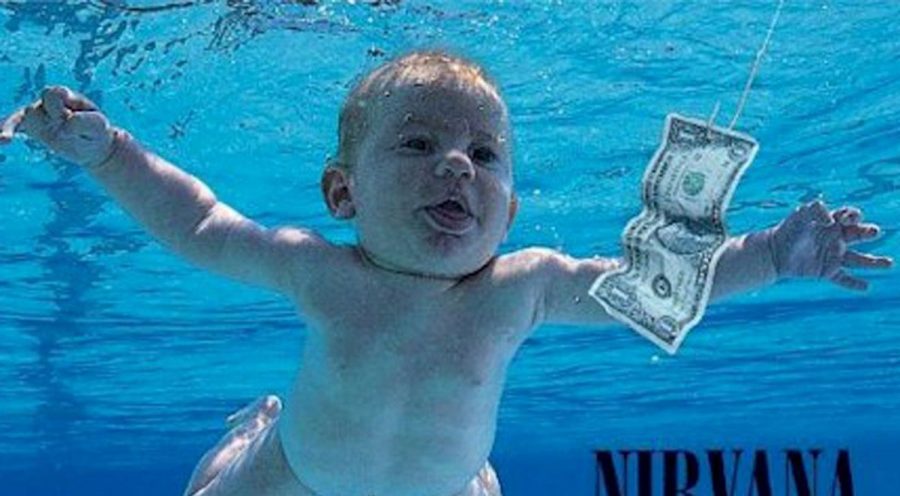Iconic naked Nirvana baby sues for child pornography
Photo courtesy of The Independent under Creative Commons License
Following a disagreement before the album was released over the image’s use as the cover, lead Nirvana singer Kurt Cobain offered the phrase, “if you’re offended by this, you must be a closet pedophile,” be put on a sticker over Elden’s genitals.
September 29, 2021
Spencer Elden, the baby pictured on the cover of Nirvana’s smash-hit sophomore album “Nevermind,” is suing for child exploitation and pornography nearly 30 years after the album’s 1991 release.
Elden, now 30, was photographed floating in a pool naked while reaching for a fish hook-hung dollar bill when he was four months old. Made to represent the departure from innocence and quest for money starting at a young age, the picture was snapped by photographer Kirk Weddle in 1991.
Elden is now suing Nirvana LLC, which includes since-deceased frontman Kurt Cobain’s estate, former members David Grohl and Krist Novoselic, Weddle, as well as Cobain’s widow Courtney Love. He claims that the band in choosing the image for the cover of “Nevermind” produced, distributed, and profited off of child pornography, and is suing each party involved for $150,000. The lawsuit also alleges that the image has affected his life negatively in areas of mental well-being and “income earning capacity.”
While in present day Elden speaks of the harm the album has caused him, his track record does not completely align with his current claims. Elden has been quoted saying that the picture has “opened doors” for him as well as posed for recreation photos throughout the years after the album’s release. He also has the name of the album, “Nevermind”, tattooed across his chest. Despite this, Elden’s lawyer contests that Elden’s parents never gave consent for how the iconic image was to be used.
As for student thoughts, overall opinion appears to be unanimous.
“This album cover is not child pornography, a naked baby isn’t sexual exploitation or child pornography. It’s just a little kid not wearing clothes,” argued sophomore Elizabeth Fairchild.
“I don’t agree with Elden’s choice and I don’t think that it’s child pornography,” echoed sophomore Farzeen Ahsan.
Elden’s mixed history with the album and timing of the case was a point particularly emphasized.
“It’s very convenient timing for him, he previously got fame from [the album] and benefited from [the album],” commented Ashan. “Why did it take him that long to want to sue?”
Elden’s claims of his “income earning capacity” being hindered was also contested.
“[Elden] even launched a career as a model because of it!” noted Fairchild.
Speaking of motives, there is agreement that Elden’s choice to sue lies beyond humiliation or the desire to alter the photo.
“It’s just a quick way for him to make cash,” said Ahsan.
“The contradictory and hypocritical nature of the whole case is filled with holes and questionable motives,” said Fairchild, bringing to light the mixed signals coming from Elden. “Is he just doing this for money?”
At the end of the day, whether Elden genuinely resents the image or not is up to the discernment of a judge. Filed on August 23rd, the lawsuit is expected to take a decent amount of time to make its way through the court system.
In the meantime, one comment by Fairchild can be applied to all relevant societal issues. “Is it socially acceptable to cause public drama for personal gain?”





